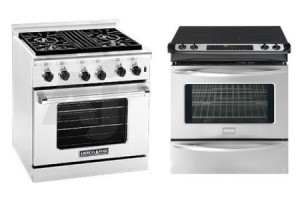Gas VS Electric Stoves:
 Gas VS Electric Stoves
Gas VS Electric Stoves If you're in the market for a new stove for your kitchen, take a look at the differences between gas VS electric stoves. Both have their advantages and disadvantages; taking a look at both will help determine which type of stove is the best for you.
Comparing Gas VS Electric Stoves
There isn't a clear winner in the gas VS electric stove debate; both have pros and cons that may vary depending on what you're used to, what hook ups are currently in your kitchen, and what type of cooking you like to do. Be sure to weigh these pros and cons carefully to make the most informed decision.
[sc name="get-started-ad" ]
Pros of Gas Stoves
The biggest pro in using a gas stove is the cooking. Turning on a gas stove gets you an instant, constant flame that you can adjust visually – no wondering if the stove is on or off, hot or cold, or if it's on the right setting.
The flames produced by a natural gas stove also cook food more quickly and evenly, because the flames spread themselves along the bottom and sides of the pan. For homeowners who really enjoy cooking, these are big plusses.
An often overlooked advantage to using a gas stove is the cost of operating it. If your home is already using natural gas – which off sets set up costs – your operating and energy costs will be lower with a gas stove than with electric.
Cons of Gas Stoves
The most immediate drawback to using a gas stove is the price. Gas stoves are typically both more expensive to purchase, and more expensive to hook up, particularly if you don't already have a gas line going to the kitchen.
The other major drawback to using a gas stove is the gas itself. If a burner doesn't turn on immediately, the stove is still releasing gas into the air – a big problem is a burner gets left on, but unlit.
Pros of Electric Stoves
Most electric stoves sold today have a sleek, glass cooktop which enhances the style of the stove itself. This glass top is easy to wipe clean of most spills; no need to remove a burner ring or wipe up a hardened spill from on top of a gas nozzle.
Electric stoves are fairly easy to operate, and less expensive to purchase and install, which makes them good choices for people who don't spend as much time in the kitchen.
An electric stove also offers the most stable work surface for pots and pans – again, a big plus for amateur cooks to consider. They also offer additional storage space beneath the oven, which gas stoves do not.
Cons of Electric Stoves
While electric stoves are fairly easy to use and operate, they cook food more slowly than gas stoves do. They can also be a problem for bakers in small kitchens, as spilled sugar on the glass top is nearly impossible to remove once it becomes heated. The glass also stains easily, which can detract from the look and style of the stove.
If you live in an area subject to frequent power outages, your stove will be inoperable during those times. Due to the amount of electricity that an electric stove uses, even some backup generators will not be able to handle the draw. This use of electricity will also cost you more to operate the stove, than the energy used by a comparable gas stove.
Find the Right Stove for You
For many people, the cost of purchasing and installing the stove typically ends up tipping the balances in the gas VS electric stove debate. With those things being equal, however, look to your lifestyle and comfort level with the stove to help make the right decision for you.
Tags
Subscribe to NV Roofing's Blog



